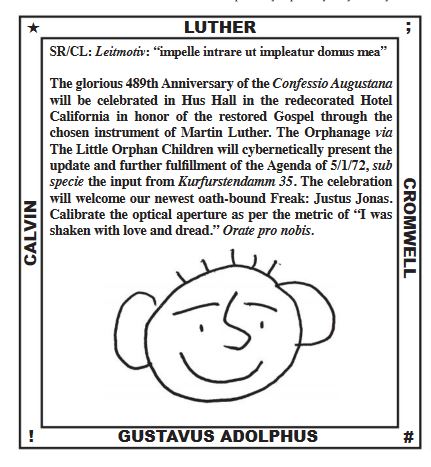
Ex-Pat 07/21/2019
There is considerable comment on the MDM FB page to the effect that it is obvious the freaks are meeting at the Hotel California on June 25th.
That does not logically follow. The ad only says "the input from Kurfurstendamm 35." Furthermore, some information is to be cybernetically
presented; why not the whole meeting done cybernetically? That would solve problems of members (freaks) being personally tailed to the
gathering. Even if it were held at the Berlin venue, large continental hotels all have private meeting rooms and areas separated from regular
booking. So it might be possible to show up at the Berlin hotel, hang out and see nothing.
Sea Cooke 06/26/2019
cf Ich bin ein Berliner
Jus 08/23/2019
There's a Hotel California on Kurfürstendamm 35 in Berlin.
https://www.google.com/maps/@52.5023646,13.3240567,3a,75y,337.32h,92.28t/data=!3m6!1e1!3m4!1sppQoNIQr5FbzeD1o74EByw!2e0!7i13312!8i6656
Anonymous 10/12/2019
There is a Protestant/Luterian church on the Kurfürstendamm avenue named Kaiser Willheml Memorial Church. Might have a
relation to this puzzle. Confession Augustana is a Latin Luterian text; the text "impelle intrare ut impleartur dormus mea"
translate to something like "enter in my house", the word "impleartur" has no results or translations, when searched just
brings a bunch of unrelated PDFs about work. There might not be a real solution to this, as it just seems to be an
"advertisement" regarding location and time.
Demi 10/12/2019
A few religious references I can spot here.
Leitmotif: A modified version of Vulgate Luke 14:23, with "compelle" replaced by "impelle". Translated, this line would be something along the lines of "Impel them to come in, that my house may be full."
Hus Hall: Hus is a reference to Jan Hus, a proto-Protestant church reformer who lived in Bohemia in the late 14th-early 15th centuries. Following the teachings of John Wyclif, he created the sect of Hussitism. For his heretical views, he was tried and executed by the Catholic clergy.
Justus Jonas: An early Protestant theologian and companion of Martin Luther, who was with the latter in his final moments.
Orate pro nobis: The plural imperative form of "Pray for us" in Latin. Used especially in the Litany of the Saints when addressing a group of saints and asking for their intercession (e.g. the archangels Michael, Gabriel, and Raphael).
Cotton Eye Joe 10/13/2019
The Leitmotiv on this page is a partial quote (and partial misspelling?) of Luke 14:23: "Then the master said to the servant, ‘Go out into the highways and hedges, and compel them to come in, that my house may be filled."
JunkBlocks 10/13/2019
This may not be as helpful, but the IV at the end of "Leitmotiv" means 4 in Roman numerals, the 4 might represent an A. Giving us the word "Leitmota." The last 4 letters backwards, it is "Atom." The last letter out of the four first letters is T. The letter T is a voiceless counterpart to the letter D (Look up International Phonetic Alphabet, you'll see what I mean). So if you voice the T, you'll get "Leid." I know that may have no meaning. So we have "AtomLeid." When you say it, it sounds like "Adam Lied." Like I said, might not be helpful.
Ryan 10.29.2019
This quote "I was shaken with love and dread" is from St. Augustine's 7th book of confessions, part 10, line 20, word 8.
All other numbers associated with this phrase should be considered, since it is described as a "metric." Here's a link
to the Google book: https://books.google.com/books?id=20GvAwAAQBAJ&
MediaSubliminal 11.27.2019
"I was shaken with love and dread" came from the Confessions of Saint Augustine.
. . . _ _ _ . . . 12.17.2019
Surprisingly, it doesn't seem anyone has pointed out the connections to music. In several ads, there are of course
obvious references (music scores, for example), but also more subtle clues. Leitmotiv is a term primarily used in
reference to music--a repeated element or theme in a musical composition--and Luther is referred to as an "instrument."
By the way, has anyone found a meaning behind the punctuation in the corners of the ad? (I'm new to this mystery,
so if that was a stupid question, I apologize.) And what do they refer to as an "optical aperture"? Sounds
very SoUE-esque.
bar 05.1.2020
The senence "impelle intrare ut impleatur domus mea" led me to the book called "The Primitive
Cisterican Breviary" written by a monk, Chrysogonus Waddell. The original copy of the book is at
"Staatsbibliothek zu Berlin" which is very close to the "Kurfürstendamm 35, Berlin".



